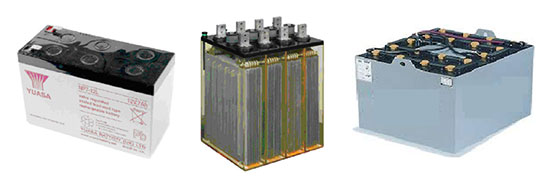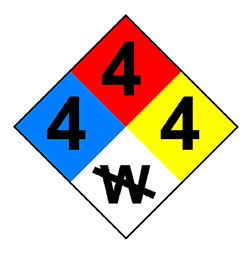Spent Lead Acid Battery Recycling
Battery Disposal
Review the regulatory, legal and financial considerations of proper decommissioning, removal and disposal of Wet Cell and Valve Regulated Lead Acid [VRLA] battery types used in Uninterruptible Power Supply [UPS] systems Forklift batteries used in accordance with current U.S. federal and state legislation.
Batteries Used as Energy Storage
The most commonly used lead-acid battery types in UPS systems are flooded cells, also called wet cells, referring to their loose electrodes that are immersed in liquid electrolytes. The next most popular is known as Valve Regulation Lead Acid [VRLA] which is a sealed battery, often referred to as maintenance free, given that the electrolytes are encased in a gel or absorptive separator and no liquid is present.
 | ||
Valve Regulated Lead Acid |
Wet Cell/Flooded Battery |
Industrial Forklift Battery |
The individual lifespan of lead-acid batteries varies greatly depending on four major factors:
• Ambient Operating Temperature
• Battery Chemistry
• Cycling
• Service and Maintenance
Ambient Operating Temperature
Lead acid battery manufacturers rate the output of their batteries based on an ambient operating temperature of 25° C [77° F]. Any variations outside this number will greatly alter the performance and life of the battery. A rule of thumb in determining the life of the battery is that for every 8.3° C [15° F], temperature above 25° C [77° F], the life of the battery is reduced by 50%.
Lead-Acid Battery Recycling
Federal law requires that all used lead-acid [Pb] batteries be managed as Universal Waste under the Code of Federal Regulations [CFR], Title 40 – Protection of Environment, Part 273 – Standards for Universal Waste Management. Title 261.3 – "Definition of Hazardous Waste" defines lead-acid batteries as hazardous waste and that they should be disposed of in accordance with that classification.
 The CFR simply prohibits the improper disposal of all lead-acid batteries. It is the responsibility of the owner/end user from the date of purchase to the date of disposal to ensure they dispose of the lead-acid battery in an appropriate and legally acceptable method. The only legally acceptable method to dispose of lead-acid batteries is to recycle them at a Resource Conservation and Recovery Act [RCRA] approved secondary smelter managed under the Environmental Protection Agency [EPA].
The CFR simply prohibits the improper disposal of all lead-acid batteries. It is the responsibility of the owner/end user from the date of purchase to the date of disposal to ensure they dispose of the lead-acid battery in an appropriate and legally acceptable method. The only legally acceptable method to dispose of lead-acid batteries is to recycle them at a Resource Conservation and Recovery Act [RCRA] approved secondary smelter managed under the Environmental Protection Agency [EPA].
Global Health Impact of Improper Lead Acid Battery Disposal
The reason for the strict set of rules governing the disposal of batteries is that lead-acid batteries are largely composed of 60-75% [by weight] lead [Pb], lead-dioxide [PbO2] and a sulfuric acid solution electrolyte. This heavy metal element makes lead-acid batteries toxic and improper disposal can be hazardous to the environment.
Improper and illegal disposal of lead-acid batteries show up in the form of pollution of our drinking water, and food produced from ingredients exposed to small and moderate levels of lead content. Humans are very susceptible to the effects of lead and children are the most vulnerable. Lead primarily targets the peripheral nervous system which causes poor growth, delayed learning and reduced intellect. This condition is also known as lead-poisoning.
An infamous and well-known case in environmental pollution, brought by a company, is the 1996 case against Hinkley Compressor Station in Hinkley, CA which settled for $333 million in a lawsuit led by Erin Brockovich and California-based lawyer, Edward L. Masry.
Legal Impact of Improper Lead Acid Battery Disposal
It is important to understand that as the owner and user of the lead-acid battery, there is a defined legal exposure to the company. In most cases, a company will hire a third party to decommission, remove, or dispose of their batteries. Upon contracting with a third party to dispose of the batteries, a Certificate of Recycling should be required containing the following information:
• Contractor name and address
• Battery type and quantity disposed
• Date of removal
• Date of disposal
• Location and number of the EPA certified recycling facility
A Certificate of Recycling will avoid future legal implications to the company in the event the third party contractor does not comply with the law. Without such certificate, and as the owner and user of the battery, the EPA can pursue various legal actions against individuals or the company.
Congress passed a law called the “Mercury-Containing and Rechargeable Battery Management Act” of May 13, 1996 or commonly known as the “Battery Act.” Under this act, the EPA is able to enforce the law and penalize any owner or user of lead-acid batteries, improperly disposing of their batteries outside of the Resource Conservation and Recovery Act. The civil penalty of any individual or corporation violating the act may not exceed $10,000 per violation, and may require immediate compliance at the expense of the violator or a combination of both.
A violation is defined as: “...when on the basis of any information the Administrator determines that a person has violated, or is in violation of, any requirement of this Act...”
Scrap Battery Certificate Search
Looking for the scrap certificate? Enter your serial number to get a copy of it.
Conclusion
As described in the paper there are a number of factors to consider when acquiring a lead-acid battery based system for your UPS system. Apart from causing documented harm to the environment leading to global health issues, there are significant financial impacts if a business is not in compliance with the law. Enforcement of the law can lead to fines and unnecessary expenses relating to clean-up orders.
References
Resource Conservation and Recovery Act [RCRA], May 10, 2007, www.epa.gov/rcraonline
Code of Federal Regulations [CRF], May 16, 2007, ecfr.gpoaccess.gov
Title 40 – Protection of Environment
- Part 261.3 – Identification and Listing of Hazardous Waster
- Part 273.1 – Standards for Universal Waste Management
Title 49 – Transportation of Hazardous Material
- Part 105 – Hazardous Materials Program Definitions and General Procedures
Let's Keep batteriesout of the landfill


